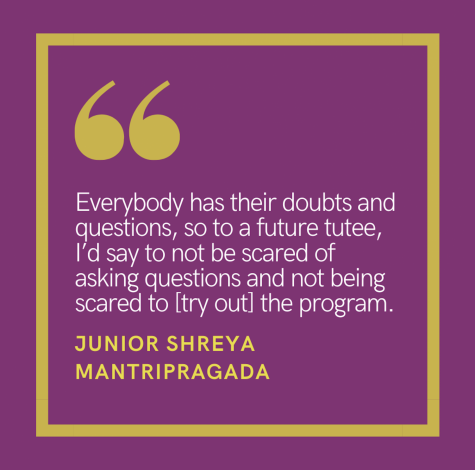Study Buddy tutoring continues throughout remote instruction
How students who need extra support are getting it during the pandemic
Photo courtesy of Barbara Frei
The free peer tutoring program, Study Buddy Society, uses this image in their flyer for the program.
January 22, 2021
During remote learning, the Study Buddy Society (SBS), a free peer tutoring program for MVHS students, continues to host tutoring sessions through Zoom. Various tutors and tutees are placed in their respective breakout rooms during their sessions, which occur Monday through Thursday every week.
The program offers tutoring for any subject, depending on the availability of each tutor, but only students who have a grade of C or lower in the class can request tutoring — ELD and SPED students can get tutoring regardless of their grade. There are currently 19 tutor-tutee pairs in the program, but Study Buddy Coordinator Barbara Frei urges more tutors and tutees to join the program. She believes that signing up is a “really good first step” for students who are falling behind in their classes.
Through Zoom, Frei monitors multiple sessions at a time by occasionally hopping into each breakout room to see how the tutor-tutee pairs are doing. Along with using a digital platform to host the sessions, Frei now provides students with more opportunities to receive tutoring by being more flexible about scheduling.
“What I wanted to change first and foremost was to have a certain amount of flexibility for everyone,” Frei said. “It was kind of rigid [prior to COVID-19], and with [everything being done] online, I thought it would also be possible to make it a little more flexible so that students who have after-school things can still apply [and] still get two lessons per week. I think that’s a big advantage now over the way it was done before the pandemic.”

Having been a part of the program as a tutor for two years, junior Shreya Mantripragada believes this program can help MVHS students build their academic mindset and grow out of their comfort zones. However, she worries that students are hesitant to join the program solely because they’re scared of asking for help.
“Asking for help shouldn’t be something that students should be scared of because everybody asks for help,” Mantripragada said. “Everybody has their doubts and questions, so to a future tutee, I’d say to not be scared of asking questions and not being scared to [try out] the program, [while also] wanting to change who you are as a person and change who you are as a student.”
While Frei does understand why a student may not immediately want to receive tutoring, she believes they may benefit from joining the Study Buddies program because all tutors are MVHS students, so they may have taken identical classes with the same teachers. This would mean that the program’s tutors likely know the expectations of those classes.
Unlike before remote learning when students would pick up paper application forms from the library, MVHS students who are looking to receive help must now fill out an online application. Likewise, students applying to be a tutor must fill out their own application, take part in a brief interview and attend a short orientation. After their services, the tutor would then receive volunteer hours.
Junior Keshav Srikant, who has been a tutor for the program for over a month, first joined the program because he thought it would be a “good, reasonably low-effort way to help students and still have a meaningful impact.” In his tutoring sessions, he first greets his tutee, then goes over the course content, whether it’s going over past assessments or providing practice problems.
“An important portion of my 45-minute session is just doing fun activities with [my tutee] and starting off the meeting asking how their day was,” Srikant said. “[This way], you can become a person that they can trust and rely on.”

Even though there are some hardships when tutoring over Zoom such as lacking the connection from in-person interactions, Srikant shares that because the sessions are held throughout the year, the tutees will gain a better understanding of the concepts over time. Srikant uses both Zoom and Google Docs to create what he says is a learning environment equally as sufficient as in-person tutoring, sharing that it has worked out great for him so far.
“It’s just very gratifying to see students understand the concept you’re trying to teach,” Srikant said. “For example, when I was tutoring a student [who was struggling with a concept, and] she finally [understood it], I watched her face light up — that was really gratifying. And the satisfaction you get watching your tutee improve over time and understanding the concepts is immense.”


















